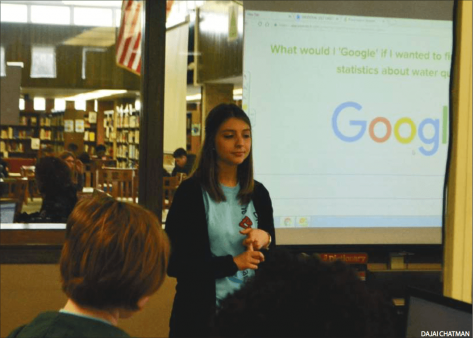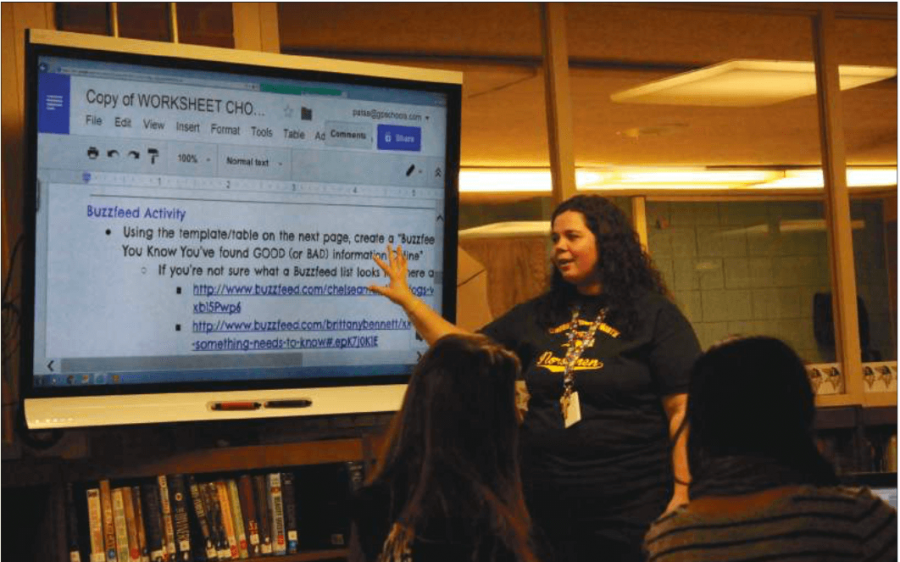Teachers team up to create two-week workshop for freshmen
Photo credit: Rachel Malinowski
Library media specialist Amanda Pata presents to freshmen in the library. The library has not had any major renovations since the school was originally built.
With strict deadlines, many students are accustomed to using the internet to search, click and copy—leaving the fact-checking behind.
Library media specialist Amanda Pata wanted to change that process, so she teamed up with freshman English teachers to create the Freshman Research and Writing Workshop. Pata said the main goal is to guide students through their English research projects by providing reliable sources and ways to safely use them.
The program was formed last year when the new library media curriculum was adopted. It is comprised of 10 exit skills: collaborative tools, creative tools, literature perspectives, online presence, personal growth, responsible/ethical/legal use of information, search strategies, source evaluation, source identification and topic development.
“I think English is just sort of a natural fit for this type of learning because it’s what you’re going to do in college. It’s what you’re going to do when you have a career. You’re always going to need to find true, reliable information,” English teacher Alyssa Sandoval said. “I think this is extremely helpful for these kids because they’re getting exposure right away when they first come into school during their freshman year and … by that point, it’ll become so second nature to them that it won’t feel as awkward.”
Pata’s two-week program is spread over the year so that she can better adjust to teachers’ schedules. On each day of the workshop, there are two sets of information skills—choosing and using. To accomplish them, there are three activities for three rotating groups. This rotation lasts for three days.
“I thought about how we could connect my curriculum to students in a more one-on-one or smaller mode,” Pata said. “It’s nice because (the teachers and I) are working with really 10 kids at a time or fewer, so all the questions that you might have in a classroom full of 30 kids that don’t get answered you have time to answer those questions and work one-on-one.”
According to the Washington Post, Google developed an algorithm early last year to tell whether facts on the internet are true. Nonetheless, Pata still notices the huge number of random search results and said the best way to combat this problem is to use databases. Since students are able to access district library reference sources on their school website, Pata stresses the idea of databases.
Although sophomore Lexi Guarini didn’t find much merit in the program last year because of her previous knowledge of the skills, she said others might benefit from the workshop. Freshman Claire Cameron is one of them. When she was introduced to databases while working on her editorial for Sandoval’s class, she noticed the difference.
“I learned a lot of tricks to use, so now when I’m trying to research stuff, I can get to what I exactly need faster because of all the little tips that we’ve been taught,” Cameron said. “It’ll be easier to find exactly what you need for papers and projects.”

Sandoval said learning about how to find true and reliable sources is very important because of the recent surge in “fake” news. She wants her students to get exposure to research so they don’t get duped by fake sources.
However, because the program began last year, the Classes of 2017 and 2018 weren’t able to participate in the workshop, meaning they didn’t learn the new curriculum exit skills. But, Pata said she tries to expose upperclassmen as well.
Because of the success of the program, Pata said she wants to continue it so students are better prepared for AP classes and college.
“Fortunately, our teachers here are amazing. They’re willing to try new things, they’re willing to revise things, so if something doesn’t work one year or even one day, we can swap it out the next day, so that’s been a really positive part of this,” she said. “I just hope that students are comfortable in doing research and don’t resent it … it could be fun, like finding information. If you got a good topic, and you find something you’re interested in and have a connection to digging into finding that information, it shouldn’t be like a job. You should have fun doing it and maybe learn something new while you’re digging.”


